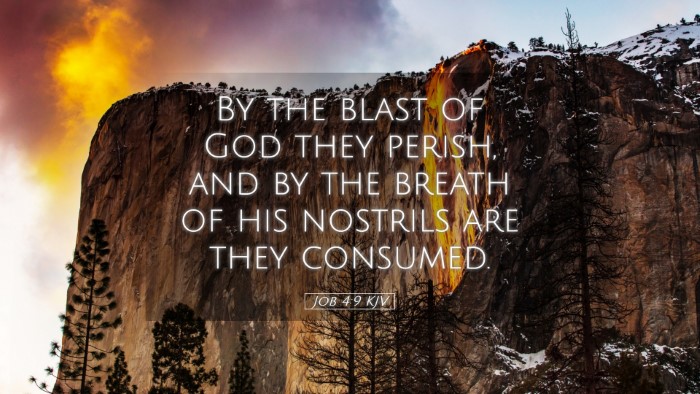Old Testament
Genesis Exodus Leviticus Numbers Deuteronomy Joshua Judges Ruth 1 Samuel 2 Samuel 1 Kings 2 Kings 1 Chronicles 2 Chronicles Ezra Nehemiah Esther Job Psalms Proverbs Ecclesiastes Song of Solomon Isaiah Jeremiah Lamentations Ezekiel Daniel Hosea Joel Amos Obadiah Jonah Micah Nahum Habakkuk Zephaniah Haggai Zechariah MalachiJob 4:9
Job 4:9 KJV
By the blast of God they perish, and by the breath of his nostrils are they consumed.
Job 4:9 Bible Commentary
Commentary on Job 4:9
Bible Verse: "By the blast of God they perish, and by the breath of his nostrils are they consumed." (Job 4:9)
Introduction
The verse from the book of Job encapsulates profound themes of the sovereignty of God over creation and the fragility of human life. Job 4:9 is articulated by Eliphaz the Temanite, one of Job's friends who comes to speak with him in his time of grief. This commentary synthesizes insights from various public domain biblical commentaries to provide a holistic understanding of this verse.
Contextual Analysis
The surrounding context of Job 4:9 is critical for understanding its implications. Job, a righteous man, has experienced profound suffering, losing his wealth, health, and family. His three friends, including Eliphaz, come to offer their counsel. However, their approach is laden with assumptions about divine justice, which they project onto Job’s circumstances. Eliphaz's speech reflects a common theological perspective—affliction is a direct consequence of sin.
Eliphaz's Theological Framework
Eliphaz appeals to personal experience and supposed divine revelation. He suggests that God's governance is so absolute that everything in the world is contingent upon His will, reinforcing the notion that calamity is a punishment from God:
- Human Frailty: Eliphaz implies that human beings are all ultimately at the mercy of God's power, emphasizing the transience and vulnerability of life.
- Divine Judgment: His assertion, "by the blast of God they perish," suggests that divine decree can lead to immediate destruction, underscoring a belief in direct retribution.
Insights from Commentaries
Matthew Henry's Commentary
Henry reflects on the sovereignty of God, noting the imagery of God's breath as an expression of His omnipotent power. He articulates a view that the power of God is such that He can extinguish life as swiftly as He gives it:
- Power of God: "The breath of God signifies the vital force that sustains all creation; when that breath ceases, life itself is extinguished."
- Justice of God: Henry posits that God's judgments—whether in life or death—are always just and serve a higher purpose that might not be immediately visible to humanity.
Albert Barnes' Notes on the Bible
Barnes expands on the poetic device used in the verse, emphasizing how God’s ability to create and destroy denotes His supreme authority. He notes:
- Imagery of 'Blast': "The term 'blast' reflects both the suddenness and the intensity with which God's judgment can fall upon the unrighteous."
- Spiritual Reflection: Barnes urges readers to consider internal spiritual conditions rather than just outward circumstances when evaluating one’s relationship with God.
Adam Clarke's Commentary
Clarke provides a practical application of the verse, stating that human beings ought to live in awareness of their dependence on God. Key insights include:
- Mortality of Man: "All humanity is in a state of dependency, and understanding this gives us a profound sense of humility."
- The Role of Breath: His commentary on 'breath' highlights that not only physical life comes from God, but also spiritual vitality; thus, separation from God leads to destruction.
Theological Implications
Job 4:9 conveys several theological implications that resonate with the overarching themes of the book of Job:
- Sovereignty of God: This verse reminds the reader that all aspects of existence are under God's control. God's power can invoke life or bring death, reinforcing the notion of divine authority.
- Mystery of Suffering: The passage points to the complexity of human suffering. While Eliphaz insists on the connection to sin, the dialogue throughout Job reveals that suffering cannot be simplified to retribution.
- Human Response: This verse calls for a humble posture before God and encourages individuals to seek understanding through prayer and reflection rather than jumping to conclusions about divine punishment.
Conclusion
In summation, Job 4:9 serves as a powerful reminder of God's sovereignty and the fleeting nature of human existence. The insights derived from Matthew Henry, Albert Barnes, and Adam Clarke encourage a deep theological reflection on suffering and the nature of divine power. For pastors, students, and theologians, it invites exploration of not only the nature of God but also the human condition in the face of inexplicable trials. Understanding such verses within their broader narrative context can offer comfort and a call to rely on God’s unfailing character amid life’s uncertainties.


